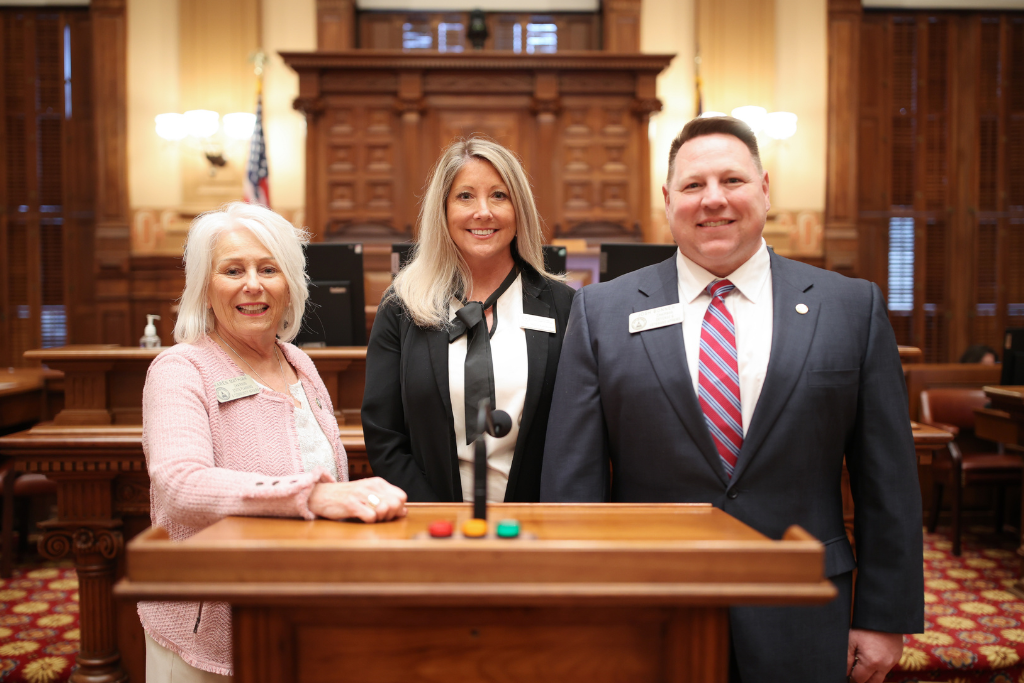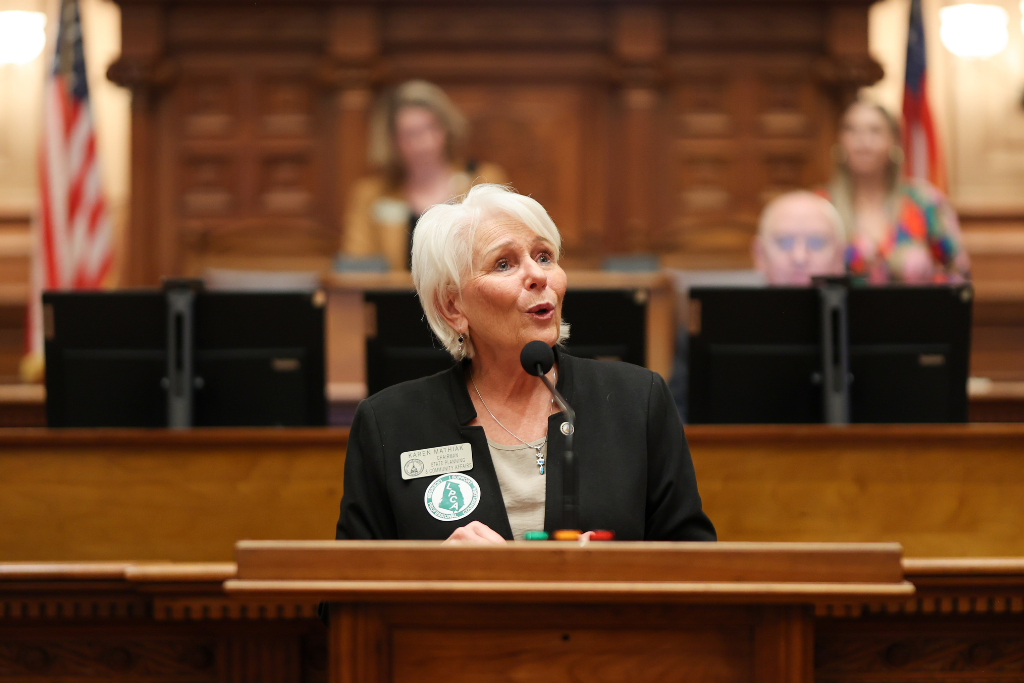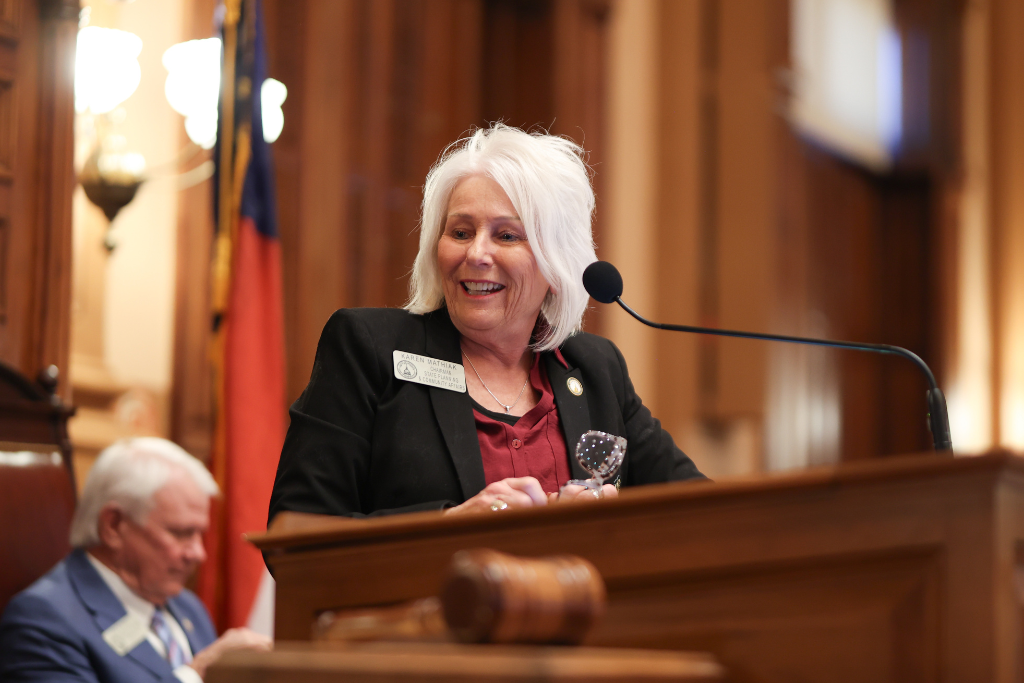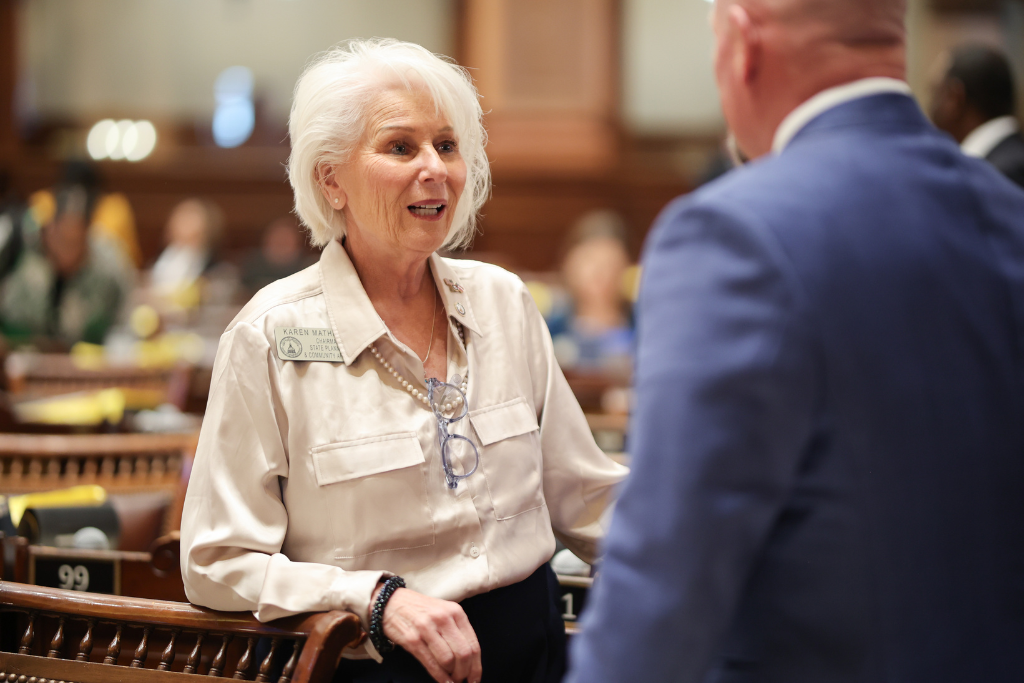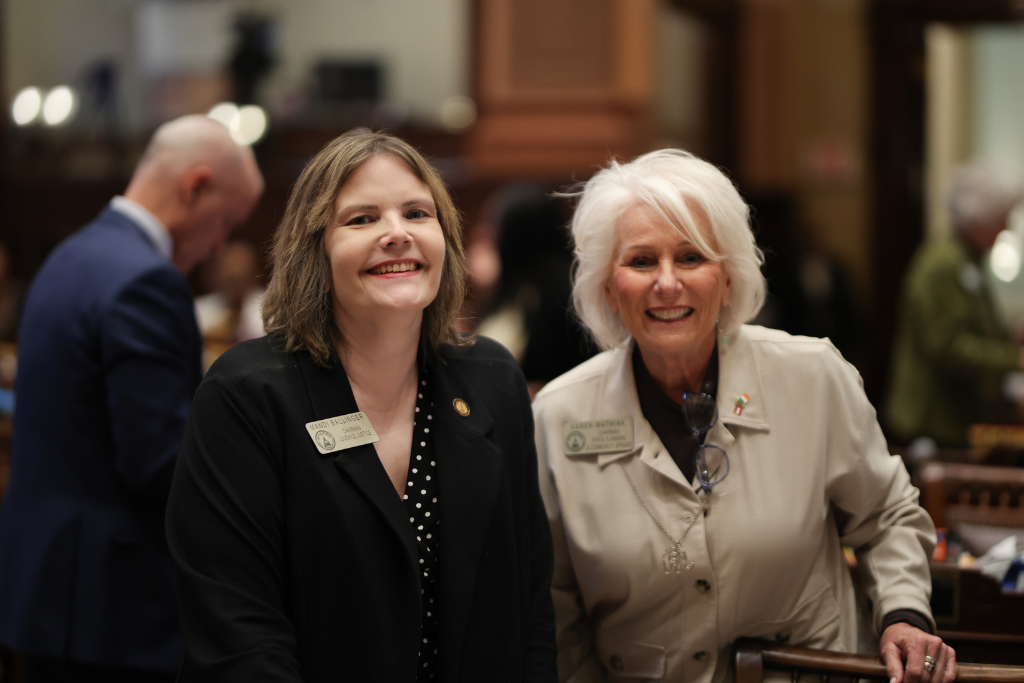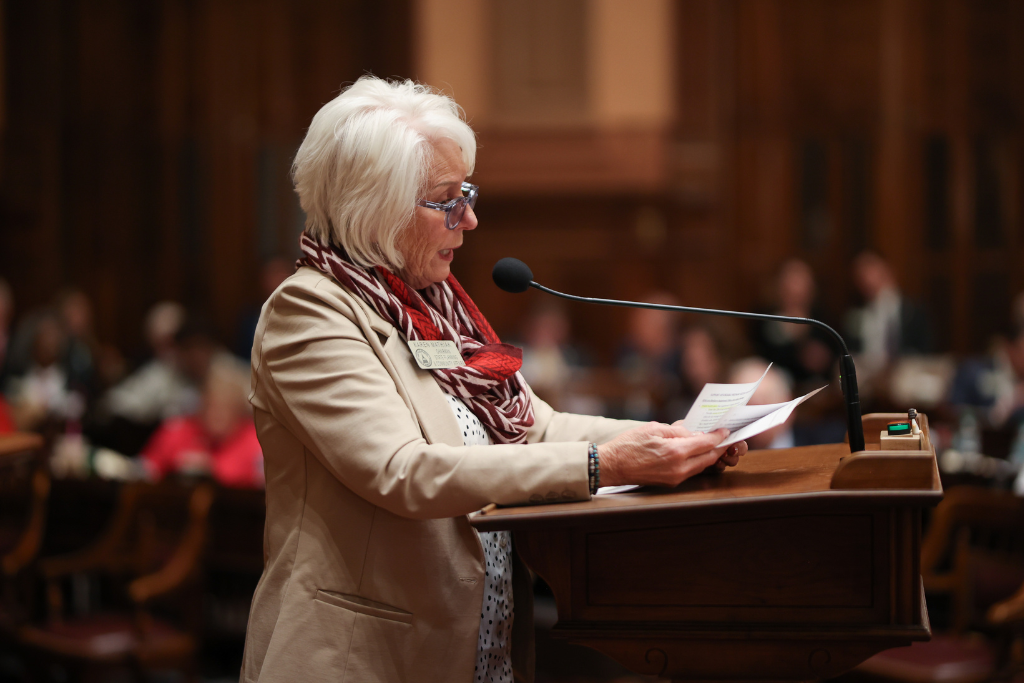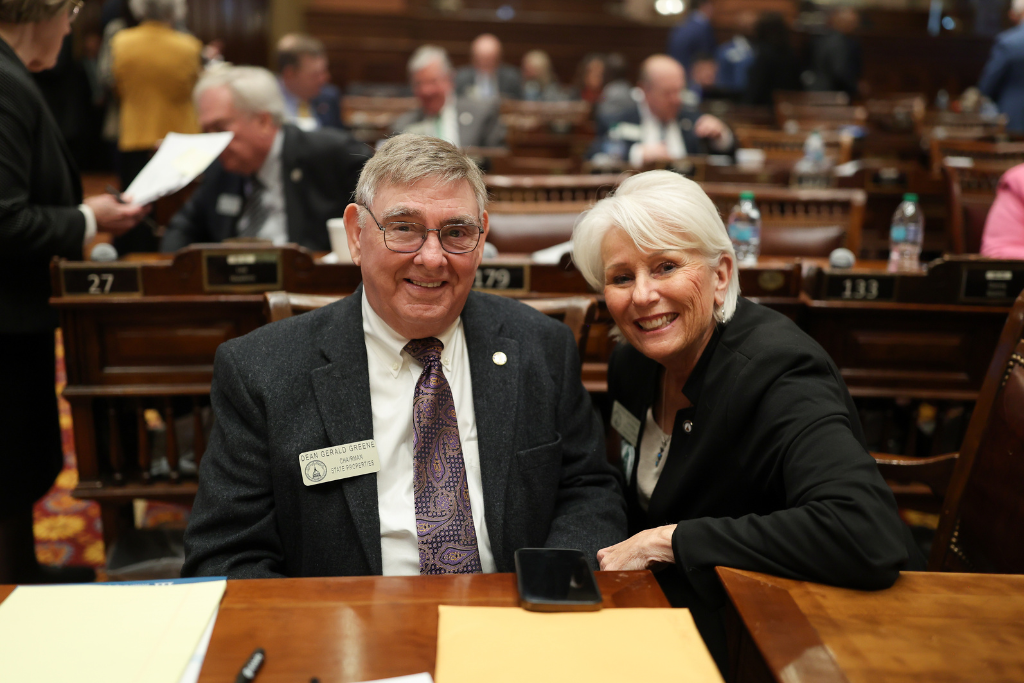Week 11 Legislative Session Recap 2025
March 25 - 28, 2025
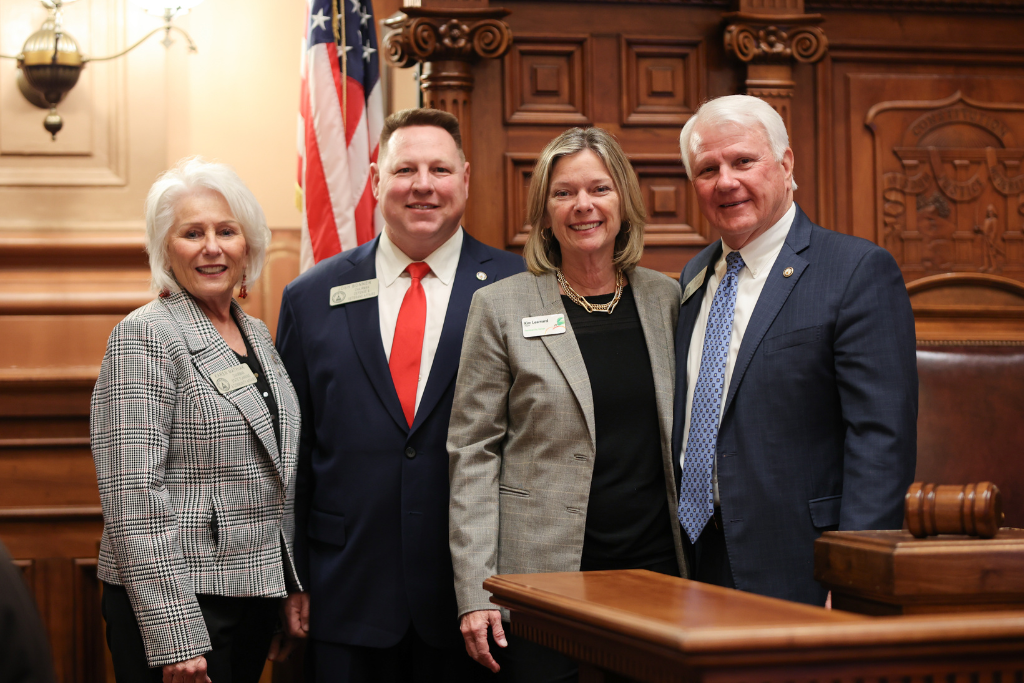
My House colleagues and I returned to the State Capitol on Tuesday, March 25, 2025, to kick off the 11th week of the 2025 legislative session. In preparation for the fast-approaching Sine Die deadline, we passed several pieces of legislation this week, including bills that passed over from the Senate, as well as giving final passage to bills that are now on their way to the governor’s desk for his decision to sign or veto. Throughout this arduous process, we remain focused on delivering meaningful solutions for our state and communities. I will highlight some of the key measures we took up this week, and I remain eager to advance more positive policy initiatives before the 2025 legislative session concludes on Friday, April 4, 2025.
The House gave final passage to Senate Bill 123 this week, a measure aimed at addressing chronic absenteeism in Georgia’s public schools. The bill would formally define chronic absenteeism as students who missed 10 percent or more of the school year. It would also introduce targeted intervention strategies to boost student attendance, while providing support over punishment for schools and students struggling with absences. Last year, 22.6 percent of Georgia’s public-school students—approximately 360,000 children—were chronically absent, missing 10 percent or more of the school year, underscoring the need for this legislation. With the objective of modernizing language in Georgia law, the bill would update the term mandatory attendance to compulsory attendance and expand the definition of a parent or guardian to include legal custodians or individuals with legal authority over a child. Importantly, the bill would not expel or penalize students solely due to excused absenteeism. Additionally, the bill would mandate that school climate committees, responsible for assessing school safety and attendance, meet at least twice a year and report their findings to the Georgia Department of Education and the Georgia General Assembly. Lastly, schools and districts with high absenteeism rates would face added oversight under SB 123 – districts with a 10 percent or higher absenteeism rate would be required to form an attendance review team, while individual schools with chronic absenteeism rates exceeding 15 percent would establish a dedicated review team. By establishing attendance review teams, schools could find solutions to chronic absenteeism and implement policies and support to get students back into the classroom. We know that being present in the classroom is vital for students’ learning, and this legislation would be a step in the right direction toward enhancing student engagement, improving academic outcomes and preparing them for postsecondary education. SB 123 now heads to the governor’s desk for his review.
The House also focused on addressing the needs of Georgia’s current and former foster children and supporting their pursuit of higher education through the passage of Senate Bill 85. The passage of this bill recognizes that supporting Georgia’s foster youth is essential to ensuring that they have the same opportunities as other young Georgians to advance their education and prepare for future careers. As such, this bill would establish the Georgia Foster Care Scholarship Act, which aims to provide financial assistance in the form of grants to current and former foster youth seeking postsecondary education. These grants would be subject to annual appropriations, and former foster youth would be eligible for the scholarship if they are under the age of 26 and have been in foster care or were in foster care for at least six months after the age of 14. The grants would cover tuition, room and board, meal plans and textbooks at eligible institutions. SB 85 would ensure that all individuals who are currently or formerly part of Georgia’s foster care system receive coverage not only for tuition but also for other essential costs of higher education. The total award amount would be based on the cost of these expenses, minus any other federal or state scholarships, with a maximum annual grant of $30,000. Eligible students could continue to receive the scholarship until they earn a bachelor’s degree, exceed a set number of attempted credit hours or reach the 10-year scholarship limit. With access to higher education, these individuals could gain the skills and qualifications necessary to enter Georgia’s workforce, contributing to the state’s economic growth. SB 85 was passed in the House by substitute and will now return to the Senate where they will review the House’s version of the bill.
Furthermore, my colleagues and I gave final passage to Senate Bill 72, which would create a legal safe harbor for rare disease patients and other vulnerable patient groups in Georgia. The bill would allow hospitals and healthcare professionals to provide cutting-edge care and treatments to patients based on their individualized condition and DNA. Under this legislation, physicians would be allowed to prescribe medications and treatments that have not yet gone through the full FDA process. Oftentimes, individualized medications for diseases that are considered rare or affect a smaller patient group are not given a full FDA process because they are costly. Instead, these treatments may go through clinics that have received official Federalwide Assurances (FWA), which ensure that they comply with U.S. federal regulations for the protection of human subjects in research. Currently, patients with rare diseases seeking these treatments in Georgia may need to leave the state to receive this individualized care. However, under SB 72, these patients would have access to individualized and physician-approved medications in Georgia. This bill seeks to support vulnerable patient populations by allowing for physician and clinic-approved medications and treatments to advance the health of rare disease patients, ultimately elongating or improving their lives.
Senate Bill 42, which aims to address certain inconsistencies in sentencing for crimes involving the exploitation of minors, also passed the House unanimously this week and is now on its way to the governor’s desk for consideration. The bill would repeal a provision in current state law that imposes penalties for offenses like keeping a place of prostitution, pimping or pandering when the victim is under the age of 18. This change would correct a rule of lenity issue, which currently allows judges to impose the lesser sentence when a defendant is charged with two similar offenses. Under current state law, judges in both Cobb and Cherokee counties have found that charges of human trafficking and pimping and pandering a minor are similar enough to trigger this rule, resulting in lesser sentences for those convicted of pimping and pandering, despite the more serious nature of the charge of human trafficking. SB 42 would align the penalties for pimping, pandering and human trafficking, sending a message that Georgia will not tolerate the exploitation of its young citizens in any form. By ensuring that charges for pimping and pandering a minor are prosecuted with the same severity as human trafficking, SB 42 would help close a loophole and ensure consistent, appropriate penalties for those who exploit minors.
Building on the foundation of Senate Bill 465, Austin’s Law, which was passed in the 2024 legislative session in memory of Austin Walters, a fentanyl overdose victim, my colleagues and I gave House passage to Senate Bill 79, the Fentanyl Eradication and Removal Act. SB 79 is part of a broader initiative to combat fentanyl-related deaths in Georgia and to address opioid abuse more generally. SB 79 would strengthen penalties for trafficking fentanyl and its equivalents by amending state law related to the manufacture, delivery, distribution, possession or sale of noncontrolled substances. Specifically, it would remove fentanyl and its equivalents from the current statute that governs opiates and creates a separate schedule of offenses for fentanyl. Under the Fentanyl Eradication and Removal Act, individuals found with at least four grams of fentanyl, or its equivalent, would face mandatory minimum sentences, starting at eight years and a $75,000 fine for amounts just over four grams and escalating based on the quantity involved. For example, the penalty for possessing 28 grams or more would be 35 years in prison and a fine of $750,000. SB 79 supports ongoing efforts to address the opioid crisis in Georgia, including initiatives like making Naloxone more widely available in schools and public buildings. Fentanyl is incredibly potent, with just two milligrams potentially being lethal, and the Drug Enforcement Administration (DEA) has found counterfeit pills containing up to five milligrams—more than twice the lethal dose. With drug trafficking organizations distributing fentanyl by the kilogram, SB 79 would, if approved by the Senate and signed by the governor, strengthen penalties for those involved in trafficking this dangerous substance, helping to protect communities.
My House colleagues and I gave final passage to Senate Bill 245, which would allow grandparents expanded visitation rights in certain situations. This legislation would permit grandparents who have been granted visitation rights to their grandchild following the death, incapacitation or incarceration of the child’s parent to petition the court and request a revision of their visitation rights up to one time every two years. Currently, under Georgia law, grandparents are allowed visitation rights in the event of a death of the parent, but this legislation would allow grandparents to go to court and request that their visitation rights be changed. However, SB 245 would still grant parents the right to revoke the visitation rights of a grandparent at any time, if needed. The bill would allow a legal avenue for grandparents to modify existing visitation orders and ensure that any modification is in the child’s best interest, requiring clear and convincing evidence before a change is granted by the court. Lastly, the bill would strengthen the legal framework for grandparent visitation rights by ensuring that changes are well-documented and justified. The goal of the legislation is to provide necessary and mutually agreed-upon updates to visitation rights, while prioritizing the well-being of children and their guardians.
As the end of the 2025 session draws near, several pieces of legislation have now received final passage in the House and Senate. I would like to highlight several bills that received final passage, meaning that these bills will now head to Governor Brian Kemp’s desk where he can sign into law or veto the legislation. One of these bills, House Bill 340, would instruct public school systems to implement policies to ban the use of personal electronic devices in the classroom from the start to the end of the school day for the purpose of keeping students engaged in their learning environments. House Bill 111 is also awaiting the governor’s decision and proposes a reduction in the individual income tax rate from 5.39 percent to 5.19 percent, effective after January 1, 2025. Similarly, House Bill 112, which would provide a one-time income tax refund to taxpayers who filed returns both in 2023 and 2024, is also on its way to the governor’s desk. The refund would be the lesser of either the taxpayer’s 2023 tax liability or $250 for single filers, $375 for head-of-household filers or $500 for married couples filing jointly. At the end of the week, the House voted to give final passage to House Bill 428, which would codify protections for in vitro fertilization (IVF) and is now awaiting the governor’s decision.
We also passed the following bills and resolution during the 11th week of session:
- Senate Bill 9, the Ensuring Accountability for Illegal AI Activities Act, which would define terms related to artificial intelligence (AI) and would establish the offense of fraudulent election interference and solicitation of fraudulent election interference by using AI-generated media in campaign advertisements. The bill would introduce the terms materially deceptive media and AI generated media and would criminalize the publication of this type of media within 90 days of an election with intent to deceive voters and influence the outcome of an election. The State Election Board would be authorized to investigate complaints regarding fraudulent election interference within 90 days of an election and would publicly release the findings or completed investigations. The attorney general would be granted concurrent jurisdiction with local district attorneys to criminally prosecute violations regarding fraudulent election interference upon recommendation from the State Election Board. The bill would clarify that the use of AI-generated content in campaign advertisements would not be unlawful as long as the proper disclosures are displayed;
- Senate Bill 40, which would prohibit a secondary metals recycler from paying more than $100 in cash for any transaction to a seller. These recyclers would also be prohibited from paying cash for used, detached catalytic converters or coils, used utility wire, used communications copper, copper wire or a battery. The bill would revise certain requirements related to registered agents and would require the locality to remit $100 of each registration fee to the locality’s general fund and $100 to the Georgia Sheriff’s Association;
- Senate Bill 44, which would amend state law by revising the definition of the qualified local school system by reducing the minimum required or equivalent millage rate from 14 mills to 10 mills. This bill would provide for a 25 percent reduction of equalization grant awards for local school systems whose millage rate or equivalent millage rate does not meet the minimum requirement. A report created by the Department of Education would be sent to certain members of the General Assembly, the House Budget and Research Office, Senate Budget and Evaluation Office and Office of Planning and Budget each year by September 1. The report would show systems that received an equalization grant the previous fiscal year, the total amount of equalization earned over the past 10 years and list any systems with a millage rate less than 10 percent;
- Senate Bill 56, which would authorize the Department of Administrative Services to purchase annuities for the payment of indemnification claims. The bill would allow for indemnification payments for claims relating to deaths of public safety officers related to COVID-19 when the death occurred on or before April 15, 2022. Applications for payment could be submitted no later than August 1, 2025;
- Senate Bill 63, which would amend state law to require local school systems to allow home study students to take the PSAT/NMSQT, SAT, PreACT, ACT or Advanced Placement exams offered by the school system to resident students. The local school system could require home school students to pay for such exam if the school requires all students to pay a fee to take the exam;
- Senate Bill 69, the Georgia Courts Access and Consumer Protection Act, which would regulate third party litigation financing in Georgia. This legislation would require litigation financiers to register with the Department of Banking and Finance and to disclose pertinent information. It would also include specific restrictions, such as a prohibition on foreign affiliations. The bill would outline contract requirements, disclosure obligations and cancellation provisions to protect consumers. It would also allow for the discovery of litigation financing agreements and would establish penalties for law violations;
- Senate Bill 105, which would allow a licensed veterinarian to practice veterinary telemedicine in the state under conditions outlined in state law and would allow a licensed veterinarian or a veterinarian technician under supervision by a licensed veterinarian to practice veterinary teletriage under conditions outlined in state law. Other code sections would be amended by adding in definitions for veterinary teleadvice, veterinary telemedicine and veterinary teletriage and by updating language to reflect these new definitions. SB 105 would further allow graduates of a foreign veterinary medicine school who are able to submit a transcript, who have completed a residency program of two or more years and have received board certification from a veterinary medicine organization recognized by the American Veterinary Medical Association, American Board of Veterinary Specialties or other American Veterinary Medical Association board-approved organizations to be able to apply for a veterinary license in Georgia. A graduate could additionally submit an Educational Commission for Foreign Veterinary Graduates (ECFVG) certificate or its equivalent, a Program for the Assessment of Veterinary Education Equivalence (PAVE) certificate or its equivalent or any other document authorized by the State Board of Veterinary Medicine. The bill would not prohibit someone licensed in this way from lecturing or giving instructions in their certified veterinary medicine specialty;
- Senate Bill 110, which would define the term blatant disregard within the Juvenile Code as a real, significant and imminent risk of harm that is so obvious to a legal custodian that a reasonable person would not expose a child to that imminent risk of harm without exercising certain precautionary measures. It would also define the term independent activity to be one that is not under the direct supervision of a legal custodian or parent and includes playing outdoors, walking to school, running errands and traveling to local commercial or recreational facilities. The bill would modify the definition of neglect to be when someone fails to provide necessary parental care rather than proper parental care. It would also narrow the requirements of when a parent must provide certain supervision necessary for the health and safety of a child to require the parent to avoid creating a real, significant and imminent risk of harm to the child as a result of blatant disregard for the parent’s responsibilities. This would further narrow what constitutes abandonment of a child under the definition of neglect to exclude when a parent or guardian permits a child to engage in independent activities that reasonably avoid substantial risk of harm. The bill would also modify state law to amend the crime of when a person causes bodily harm to or endangers the bodily safety of another through conscious disregard of another’s safety to explicitly not include when a parent or legal custodian permits a child to engage in one or more independent activities unless doing so constitutes neglect;
- Senate Bill 112, which would create a new article in state law to allow an HVAC system manufacturer’s warranty to be conveyed to a new owner of a residential property should a conveyance of property take place;
- Senate Bill 119, which would revise provisions regarding when manufactured homes become real property, specifically through a certificate of permanent location. When a certificate of permanent location is filed, the commissioner would notify the holders of all listed security interests that a certificate has been filed and the certificate of title has been surrendered. The filing of a certificate of permanent location and the surrender of a certificate of title would not impair the rights and remedies of a prior interest holder until the interest has been satisfied. Additionally, the filing of a certificate of permanent location and the surrender of a certificate of title would not impose additional licensing or conduct requirements on the lien or security interest holder;
- Senate Bill 147, which would allow state correctional institutions to provide for the release of certain criminal history, vocational and educational information for inmates upon release. The bill would provide for the issuance of an identification card and a Program and Treatment Completion Certificate;
- Senate Bill 149, which would revise the institution eligibility for tuition equalization grants to require classification as a Level VI institution by the Southern Association of Colleges and Schools Commission on Colleges;
- Senate Bill 180, which would allow apprenticeship sponsors to perform specified tasks related to conducting an apprenticeship program;
- Senate Bill 193, which would authorize the Technical College System of Georgia to establish the adult workforce high school diploma program, which would have a sunset date of July 1, 2031;
- Senate Bill 233, which would increase the number of members of the Behavioral Health Reform Innovation Commission from 24 to 30. The six members added must be: a certified addition recovery specialist with lived experiences; an intellectual and developmental disabilities provider; an individual who has lost an immediate family member to a drug overdose; a leader of an intellectual and developmental recovery nonprofit; and someone with or a parent of someone with intellectual and developmental disabilities. The bill would also replace the Involuntary Commitment and Workforce System Development subcommittees of the commission with Addictive Diseases and Intellectual and Developmental Disabilities. The commission’s abolishment date would be extended from June 30, 2025, to December 31, 2026;
- House Resolution 273, which would designate the City of Incheon, South Korea as the sister city-state of Georgia.
On Monday, March 31st, we will return for the 12th and final week of the 2025 legislative session. In the final days of the 2025 legislative session, I will continue working for our district and fighting for our communities. You can access committee schedules, livestreams and the status of bills on the Georgia General Assembly’s website, linked here.
I encourage you to reach out with any questions or concerns regarding the bills being considered by visiting my Capitol office, calling 404-656-0213, or emailing
karen.mathiak@house.ga.gov. As always, thank you for allowing me to serve as your representative.

